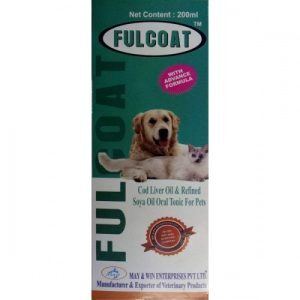Table of Contents
Cod Liver Oil and Soya Oil are beneficial supplements for cats and dogs, offering numerous health advantages. Cod Liver Oil is rich in essential omega-3 fatty acids, such as EPA and DHA, which support healthy skin and coat, improve joint mobility, and promote overall cardiovascular health. Additionally, it contains vitamins A and D, contributing to optimal vision, immune function, and bone strength. On the other hand, Soya Oil is a source of omega-6 fatty acids that can further enhance skin and coat health while providing energy. When appropriately incorporated into a pet’s diet, these oils can contribute to their well-being and vitality.

What Is FulCoat Oral Tonic?
FulCoat is an oral tonic formulated for pets, containing a blend of cod liver oil and refined soya oil. This tonic promotes a glossy and radiant coat, diminishes inflammation, enhances bone health, alleviates joint discomfort, and eases symptoms of rheumatoid arthritis. It also contributes to ocular well-being, lowers the risk of heart disease, mitigates manifestations of anxiety and depression, and aids in the healing of stomach and gut ulcers.
Packaging: 200ml bottle presentation.
Ingredients
- Cod Liver Oil;
- Refined Soya Oil.
Uses of FulCoat
FulCoat addresses a range of conditions in both cats and dogs, including inflammation and joint pain, offering relief to pets with discomfort and mobility issues. For those who have rheumatoid arthritis, FulCoat can help mitigate symptoms and enhance joint health. By reducing heart disease risk, this tonic supports cardiovascular well-being in pets. FulCoat’s formulation also assists in managing anxiety and depression symptoms, contributing to their mental wellness. Furthermore, it aids in the healing of stomach and gut ulcers, providing relief to pets with gastrointestinal distress.
Dosage Sizes
The dosage of FulCoat should be administered according to the specific instructions provided by a veterinarian or as indicated on the product packaging. Generally, dosages are determined based on factors such as the pet’s size, age, and health status. It is crucial to follow the recommended dosage guidelines to ensure the safety and effectiveness of the supplement.
Typically, oral tonics like FulCoat are administered by mixing the appropriate amount with the pet’s food or directly administering it using a dropper or syringe. It’s important not to exceed the recommended dosage, as excessive supplementation can lead to adverse effects.
If a pet is currently under any other medications or has pre-existing health conditions, it’s advised to consult a veterinarian before introducing FulCoat or making any changes to the dosage. Regular veterinary check-ups can help monitor the pet’s response to the supplement and make necessary adjustments.
Important Safety Information for Pet Owners
Adhere strictly to the recommended dosage provided by your veterinarian or on the product label. Overdosing can lead to adverse effects.
Monitor your pet closely after starting FulCoat. Look out for any signs of adverse reactions such as vomiting, diarrhea, lethargy, or changes in behavior. If observed, discontinue use and contact your veterinarian.
Be aware of any known allergies your pet might have to ingredients in FulCoat. If your pet has a history of allergies, discuss this with your veterinarian before using the supplement.
When introducing FulCoat for the first time, consider a gradual transition. Start with a smaller dose and monitor your pet’s response before increasing to the recommended dose.
Avoid administering FulCoat simultaneously with other medications unless your veterinarian advises to prevent potential interactions.
If using FulCoat as a long-term supplement, periodically assess its ongoing benefits in consultation with your veterinarian.
Remember that FulCoat is a supplement, not a replacement for proper veterinary care. If your pet has a medical condition, consult your veterinarian for appropriate treatment.
If you suspect any adverse effects related to FulCoat, report them to the manufacturer and your veterinarian.
Veterinary Prescription
Whether you need a veterinary prescription to buy FulCoat depends on the specific regulations and requirements of the product in your location. In most countries, this product is available over-the-counter.
To determine whether you need a veterinary prescription to purchase FulCoat, contact your veterinarian and ask whether FulCoat is recommended for your pet. They can guide whether a prescription is necessary and whether the supplement is appropriate for your pet’s specific needs.

Interactions
Interactions with FulCoat can occur with medications, supplements, or specific health conditions. Here is the general information for potential interactions with supplements and medications:
- Blood-Thinning Medications: Omega-3 fatty acids, often found in supplements like FulCoat, can have blood-thinning effects. If your pet is on blood-thinning medications, combining them with FulCoat may increase the risk of bleeding.
- Anti-Inflammatory Medications: If your pet is on anti-inflammatory medications, like NSAIDs, combining them with FulCoat might potentiate the effects. This could lead to increased bleeding risk or gastrointestinal issues.
- Immune-Suppressing Drugs: Omega-3 fatty acids may have immune-modulating effects. If your pet is on immune-suppressing medications, using FulCoat could interact with the desired effects of those drugs. Discuss this with your veterinarian.
- Antioxidant Supplements: FulCoat might contain antioxidants that could interact with other antioxidant supplements your pet might be taking. While antioxidants are generally beneficial, excessive intake might not be appropriate.
- Individual Sensitivities: Some pets might have sensitivities or allergies to specific components of FulCoat. Be cautious if your pet is already known to have allergies or sensitivities, and monitor for any adverse reactions.
- Gastrointestinal Medications: If your pet is on medications for stomach issues, FulCoat’s oily composition might affect the absorption or efficacy of those medications.
- Diabetes Medications: Omega-3 fatty acids could influence blood sugar levels in diabetic pets. If your pet has diabetes, consult your veterinarian before adding new supplements.
- Thyroid Medications: Some supplements might affect thyroid hormone levels, especially if they contain iodine. If your pet is on thyroid medications, consult your veterinarian.
These are general considerations. Always consult your veterinarian before introducing any new supplement, medication, or change to your pet’s routine.
Side Effects
There is not much information about FulCoat’s side effects. Here are possible side effects that might be associated with this supplement:
- Gastrointestinal Upset: Oils and supplements rich in omega-3 fatty acids can sometimes lead to gastrointestinal issues such as diarrhea, vomiting, or an upset stomach. This is especially true if the supplement is introduced too quickly or at a high dosage.
- Allergic Reactions: Some pets can have allergies or sensitivities to certain ingredients. Watch for signs of allergic reactions, including itching, swelling, hives, or difficulty breathing.
- Bleeding Issues: Omega-3 fatty acids, especially in high doses, can have blood-thinning effects. This could increase the risk of bleeding, particularly if your pet is on blood-thinning medications.
- Vitamin A and D Toxicity: If FulCoat contains high levels of vitamins A and D, excessive consumption could lead to vitamin toxicity. These vitamins are fat-soluble and can accumulate in the body.
- Interactions with Medications: Some supplements can interact with your pet’s medications. For instance, omega-3 fatty acids might interact with blood-thinning medications, immune-suppressing drugs, or certain heart medications.
- Digestive Distress: High doses of certain oils might cause digestive disturbances. It’s important to introduce any new supplement gradually to give your pet’s system time to adjust.
- Weight Gain: Some oil-based supplements can be calorie-dense. Overconsumption could lead to weight gain if not properly balanced with your pet’s dietary needs.
- Changes in Blood Sugar: For pets with diabetes, certain supplements might affect blood sugar levels. If your pet has diabetes, discuss any supplement with your veterinarian.
- Thyroid Disruption: If the supplement contains iodine or other components that can influence thyroid function, it might impact pets with thyroid conditions.
- Individual Variability: Keep in mind that each pet is unique. Some pets might tolerate supplements well, while others might experience adverse reactions.
To ensure your pet’s safety, always consult your veterinarian before introducing any new supplement to their diet.
Overdose
Here is the general information on what might happen if a pet ingests an excessive amount of a supplement:
- Gastrointestinal Upset: One of the most common reactions to an overdose of supplements, especially those containing oils or fatty acids, is gastrointestinal upset. This can manifest as vomiting, diarrhea, or an upset stomach.
- Bleeding Risk: If FulCoat contains omega-3 fatty acids, an overdose could increase the risk of bleeding due to their blood-thinning properties. This might be more concerning if your pet is also on blood-thinning medications.
- Vitamin Toxicity: If FulCoat contains vitamins A and D, consuming too much could lead to toxicity. Both vitamins are fat-soluble and can accumulate in the body, causing various symptoms.
- Organ Strain: An overdose of specific components could strain your pet’s liver or other organs, especially if the body cannot process excessive amounts.
- Weight Gain: Overconsumption of any calorie-dense supplement could lead to weight gain if it’s not properly balanced with your pet’s dietary needs.
- Adverse Reactions: Pets can react differently to different substances, and an overdose might trigger allergic reactions or other unexpected adverse effects.
It’s essential to prevent overdoses by following the recommended dosage instructions provided by your veterinarian or on the product packaging. If you suspect your pet has ingested an excessive amount of FulCoat or any supplement, contact your veterinarian or an emergency veterinary clinic immediately. In cases of overdose, prompt medical attention can help minimize potential harm and ensure your pet’s well-being.
Storage
Store FulCoat in a cool, dry place away from direct sunlight, heat sources, and moisture. Exposure to heat and humidity can degrade the quality of the product.
Whenever possible, keep FulCoat in its original packaging. The packaging is designed to protect the product from external factors that could compromise its quality. If the original packaging is not resealable, transfer the contents to an airtight container. This helps maintain the supplement’s freshness and prevents air and moisture from affecting its potency.
Store FulCoat out of reach of children and pets. The supplement is intended for your pet’s consumption and should not be accessible to others. Store FulCoat separately from your pet’s food to prevent any accidental contamination. Avoid storing FulCoat near chemicals, cleaning products, or other substances that might emit strong odors or fumes.
While refrigeration might be appropriate for some supplements, others, particularly oil-based supplements, can become cloudy or solidify in cold temperatures. Check the label for guidance.
Regularly inspect the supplement for changes in color, texture, or odor. If you notice any significant changes, it might indicate spoilage, and you should refrain from using the product.
FAQ
How does FulCoat benefit my pet’s coat?
FulCoat contains essential fatty acids that promote a lustrous and shiny coat in pets. These fatty acids help maintain skin health and improve the quality of the fur.
Can FulCoat help with joint issues?
Yes, FulCoat’s formulation includes ingredients that can aid in reducing joint pain and inflammation, potentially improving your pet’s mobility and comfort.
Is FulCoat suitable for pets with specific health conditions?
FulCoat’s benefits are varied, including support for joint health, coat appearance, and overall wellness. However, it’s best to consult your veterinarian to ensure it’s appropriate for your pet’s health condition.
Can I give FulCoat to both cats and dogs?
Yes, FulCoat is often formulated for both cats and dogs. However, checking the specific product label is essential to ensure it suits your pet’s species.
Can I give my pet more FulCoat than recommended for faster results?
It’s essential to stick to the recommended dosage. Giving more than recommended might lead to adverse effects and won’t necessarily provide faster results.

































